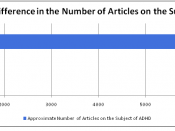The brain is inarguably one of the most complex organs in the body. Messages sent between neurons in the brain are responsible for our thoughts, perceptions, actions and reactions. Like an intricately wired machine, the brain is the organ that, essentially, controls the entire body. However, with such complexity comes an increased risk of malfunction. In her book, The Human Brain: A Guided Tour, Susan A. Greenfield estimates the number of neurons in the brain to be around 100 billion. With such an enormous amount of "wires" making up such a complicated "machine", it is not surprising that brain disorders can and do occur. Attention Deficit Disorder is one such illness that can stem from a problem in the brain. Attention Deficit Disorder, or ADD, is an inability to pay attention or concentrate at a desired level. Many people with ADD are treated with psychostimulant drugs like Ritalin, Adderall or Concerta, among others.
Psychostimulant drugs excite the central nervous system, usually causing increased alertness, focus and feelings of well being, but also sometimes causing a calming effect in hyperactive people. There are naturally occurring and synthetic psychostimulant substances with amphetamines belonging to the latter group. These amphetamines are the most commonly prescribed medications today in the treatment of ADD. Although scientific research is showing that many sufferers of Attention Deficit Disorder are benefiting from treatment with amphetamines, the use of these drugs is certainly not without its risks.
In his book, Talking Back to Ritalin, Peter R Breggin, MD, details a number of brain functions that can be adversely affected by the use of stimulant drugs. Dr Breggin states that the amphetamines prescribed to treat ADD can cause significant damage in numerous areas of the brain including the cerebral cortex, frontal lobes, limbic system, basal ganglia, temporal lobe, parietal...



Gj
This is good because people should realize that ritalin has negative effects. Many people in my school unknowingly take it unprescibed to help them study all night or to concentrate on tests.
5 out of 5 people found this comment useful.